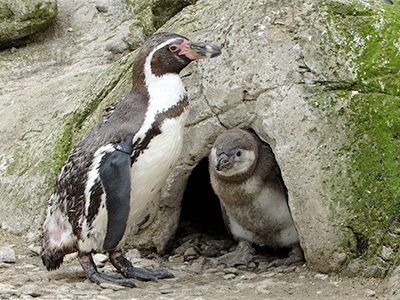First Penguin chicks of the season hatch at Cotswold Wildlife Park

Cotswold Wildlife Park welcomes three Humboldt Penguin chicks to the colony. After spending over two months inside their nests, the three chicks have finally ventured out and are acclimatising to their new surroundings.
First out the nest was Peanut (pictured above), hatched to parents DJ and Mrs Doyle. A few days later, the Park’s oldest Penguin, Mushy (aged twenty-four) produced two chicks with father Wonky. Sadly, due to an age-related illness, Wonky is now rearing his chicks alone. Named Basil and MJ by keepers, the two female chicks are healthy and developing well under the watchful eye of their father.
Humboldt Penguins (Spheniscus humboldti) are one of the world’s seventeen Penguin species and they live along the South American coastline of Peru and Chile. In the wild, these boisterous birds nest in the driest desert on earth, the Atacama. This species was originally named after the cold water current it swims in, which itself is named after Alexander von Humboldt – Prussian geographer, naturalist and explorer.
They are becoming increasingly rare and are listed as vulnerable on the International Union of Nature’s (IUCN) Red List of Threatened Species. This species are susceptible to disturbances in their food chain caused by strong El Nino currents. Overfishing, entanglement in artisanal fishery nets, harvesting of guano deposits (which Penguins rely on to build their nest), illegal capture for consumption and the pet trade also threaten their survival. It is estimated that approximately 12,000 Humboldt Penguins currently exist in the wild.
Penguins mate with a “Cloacal Kiss”. Male Penguins, like ninety-seven percent of bird species, do not grow penises. When it’s time to mate, the cloaca (an orifice found on the rear of both bird sexes) will swell. The male mounts the female and the “kiss” ensures sperm transfer from the male to the female. Incubation of the egg lasts around forty days, with both adults changing incubation duties regularly. The chick remains in the nest until its mesoptile plumage has fully developed (one of the second set of down feathers). Even then, the chicks rarely venture far from the nest prior to fledging. This fluffy mesoptile plumage enables the chick to maintain its own body temperature, allowing the new parents to leave the burrow in search of food for their hungry offspring. Penguins will mate with the same member of the opposite sex season after season.
Cotswold Wildlife Park has proudly supported Penguin Conservation in the Falkland Islands for over thirty years. Thanks to the generosity of visitors, so far over £30,000 has been raised for the charity. Find out more about their conservation work here: http://www.falklandsconservation.com.
Explore Gloucestershire
25 July 2016
For further information.
OTHER NEWS
